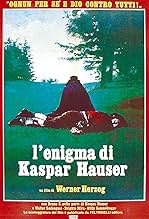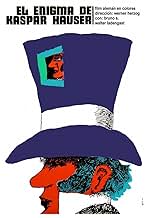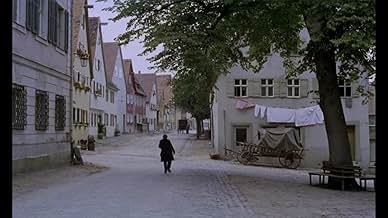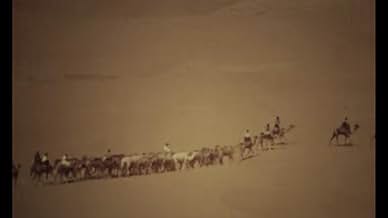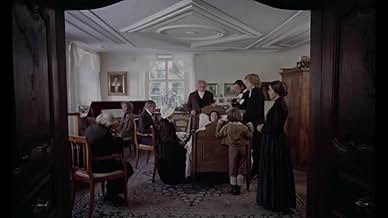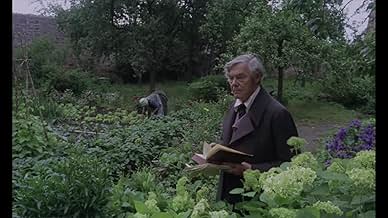CALIFICACIÓN DE IMDb
7.7/10
20 k
TU CALIFICACIÓN
Un joven apenas capaz de hablar y caminar, y portando una extraña nota aparece repentinamente en Núremberg en 1828.Un joven apenas capaz de hablar y caminar, y portando una extraña nota aparece repentinamente en Núremberg en 1828.Un joven apenas capaz de hablar y caminar, y portando una extraña nota aparece repentinamente en Núremberg en 1828.
- Dirección
- Guionistas
- Elenco
- Premios
- 5 premios ganados y 3 nominaciones en total
- Dirección
- Guionistas
- Todo el elenco y el equipo
- Producción, taquilla y más en IMDbPro
Opiniones destacadas
It's a well known philosophical conundrum, would a man be able to think (or even be properly considered a man) if he was denied all sensory stimulation? In Nuremburg in 1828, there was a practical test of this proposition, when a person was discovered in town who had spent all his previous life incarcerated and denied human contact. He was duly taught how to think; but in fact, was not grateful for the experience. Werner Herzog's film examines the strange life of Kaspar Hauser - I find it hard to say whether or not I consider it a good film, because that life itself was so strange. Certainly it better recreated the bafflement of those who interacted with Kaspar than it managed to suggest what it really felt like to be Kaspar - but then, who could know? It's probably not Herzog's greatest achievement - but it's certainly an intriguing subject.
Werner Herzog's films reach emotional and aesthetic levels that few directors can aspire to. As one of the rare film-maker's more concerned with the artistry of their work than what they achieve at the box office, Herzog is nearly peerless in his purity and ideosynchrasy. Herzog uses the film medium as a moving canvas upon which he expresses, affects, and creates nightmares and dreamworlds which are so vividly real that they threaten our own naturalized consciousness of the projection we call reality.
So much for the postmodern gobbledygook. As you can tell, I love Herzog.
This early film deals with many of the familiar elements that tend to permeate Herzog's films - cultural critique, the insanity of everyday life, alienation, cruelty and power. But here, Herzog uses a true story of 19th century Europe as a vehicle, and treats his subject with an unusual compassion and straightforwardness.
Herzog's incredible casting talent also shows here, just as it does in all of his films. I do not wish to take anything away from the great performers, but really, how does one manage to choose an actor whose life experience is broadly similar to that of Kaspar Hauser's without knowing of it beforehand? This film blends somewhat disjointed artistic imagery with the true story of Kaspar Hauser, a man apart from society who has been kept in a cellar all of his life, and is suddenly expelled into the light in Nuremburg. He is adopted by a kindly old gent who attempts to socialize him in what appears to Kaspar (and perhaps to us through the film's clear vision) an insane society full of lies and contradictions. All of this is done with the believability that is so consistent in Herzog's theatricality, and the visual quality that qualifies him as a true cinematographic artist.
So much for the postmodern gobbledygook. As you can tell, I love Herzog.
This early film deals with many of the familiar elements that tend to permeate Herzog's films - cultural critique, the insanity of everyday life, alienation, cruelty and power. But here, Herzog uses a true story of 19th century Europe as a vehicle, and treats his subject with an unusual compassion and straightforwardness.
Herzog's incredible casting talent also shows here, just as it does in all of his films. I do not wish to take anything away from the great performers, but really, how does one manage to choose an actor whose life experience is broadly similar to that of Kaspar Hauser's without knowing of it beforehand? This film blends somewhat disjointed artistic imagery with the true story of Kaspar Hauser, a man apart from society who has been kept in a cellar all of his life, and is suddenly expelled into the light in Nuremburg. He is adopted by a kindly old gent who attempts to socialize him in what appears to Kaspar (and perhaps to us through the film's clear vision) an insane society full of lies and contradictions. All of this is done with the believability that is so consistent in Herzog's theatricality, and the visual quality that qualifies him as a true cinematographic artist.
This is the third Werner Herzog film I have watched. The first two were Signs of Life and Aguirre: The Wrath of God. All for themselves and God against All is by far my favorite Herzog movie (and my favorite title). The exploration of Kaspar's primitive mind was fascinating and, at times, even humorous. I enjoyed Kaspar's disdain for the arrogant priests and scientists (but especially the priests!). Like every Werner Herzog movie I've seen thus far, the film does not progress at breakneck speed. This is definitely a turn-off to most movie-goers. I can relate. (Signs of Life had me checking my signs of life). However, I felt that the significant and often humorous dialogue more than made up for the admittedly slow pace.
One of the most evocative and quietly moving films ever produced on the subjects of cultural displacement, exploitation and personal despair, with director Werner Herzog producing a pure work of cinema as sensitive as the character that he depicts. With this particular film, Herzog created perhaps the ultimate statement about the perseverance of the human spirit, whilst simultaneously creating a world that is deliberately abstracted in order to convey the perspective of a character out of step with society and the period that embraced him. Like many of Herzog's films from this era, such as Even Dwarfs Started Small (1970) and Stroszek (1977) in particular, The Enigma of Kaspar Hauser (1975) is essentially about looking at the world from the outside in; with all of the separate elements distorted in order to convey the world-view of this perennial outsider seeing himself for the very first time. In a manner similar to that of David Lynch's subsequent film, The Elephant Man (1980), Herzog uses elements of the real-life story behind the character simply as an excuse to ruminate on the notions of alienation, the nature of conspiracy, personal exploitation and degradation, as well as the often underhanded mechanisms of a seemingly enlightened society, in a way that goes beyond the mere superficial levels of the narrative.
The point of the film is expressed by the original German title, "Jeder für sich und Gott gegen alle", or "every man for himself and God against all". In keeping with this, the nature of religion is brought up twice in the film and dismissed on both occasions by the central character, who claims to be too unfamiliar with the concept of spirituality to be able to make an informed opinion. The church argues that Kaspar should believe simply as an act of blind faith and that a leap of faith will overcome any such notions of knowledge or conception. It is a keen comment on the part of Herzog and one that ties into the idea of Kaspar as an unspoiled being; an almost childlike figure, though in the possession of a keen intelligence and a passionate creative spirit, who ultimately finds himself persecuted for reasons that neither he nor we could ever truly comprehend. In the hands of any other filmmaker, the depiction of Kaspar would have no doubt been that of the traditional outcast; desperately trying to find their own identity in the form of a triumph over adversity. However - again looking back to the subject matter of Even Dwarfs Started Small - Herzog instead gives us a representation of the sane man in the insane world; showing us how the corruption and inherent evil of self-preservation can take a gentle and contemplative spirit and crush it completely; a notion that is beautifully illustrated in a cinematic sense by the scene in which Kaspar sows his name with seeds into the flower bed, only to return one day from an outing to find that it has been trampled by an intruder.
Moments like these are characteristic of Herzog's continually fascinating style of direction from this particular period, as he approached cinema from a perspective similar to that of filmmakers like Peter Watkins, Ken Russell or Pier Paolo Pasolini by investigating the workings of a period setting from a more contemporary perspective. So, we have the authentic costumes, locations and an attempt to recreate the values and mannerisms of this particular society, all the while being abstracted by Herzog's continually probing camera that lingers and explores - often hand-held - through the various cobbled back-streets and stately homes from where the drama plays out. Herzog has often claimed that there is (or was) no real distinction between his documentary work and his more cinematic features, with both particular examples coming from the same place and attempting to convey what Herzog refers to as "the ecstatic truth". You can see this ideology clearly with the film, as the director mixes a non-actor in the shape of Bruno S. alongside professional performers like Walter Ladengast and Brigitte Mira. As a result of this, there is a heightened quality to the portrayal of Kaspar, as well as a genuine sense of dependence on the two characters that come to care for him, as the more experienced cast members take Bruno under their wing and coach him along in a manner reminiscent of the actual characters themselves.
The juxtaposition between the two styles of documentary realism and purposeful cinematic expression can be seen in the visualisation of the film; from the naturalistic cinematography of Jörg Schmidt-Reitwein - with its emphasis on light and shadow and expressive use of landscapes - to the use of classical music (which here gives the film a yearning, almost romantic sense of melodrama to contrast against the more downbeat elements of the film). From its stark and impressionistic opening vignette - with its allusions to a dreamlike evocation somewhat removed from the rest of the film - to the beguiling fever-dream of caravans moving through a barren desert as the film reaches its close, The Enigma of Kaspar Hauser is an absolute masterpiece from a director here at the very top of his creative peak. It is without question unlike any other film you will ever see; one that is rich in character and a believable evocation of period detail, but one that also presents a genuinely unique and unforgettable cinematic vision. In Herzog's film, it is the world that is wrong and confused, with Kaspar becoming a sort of representation for the very greatest qualities of humanity in the face of this vile corruption. A powerful and emotive concept as passionately realised as the film itself.
The point of the film is expressed by the original German title, "Jeder für sich und Gott gegen alle", or "every man for himself and God against all". In keeping with this, the nature of religion is brought up twice in the film and dismissed on both occasions by the central character, who claims to be too unfamiliar with the concept of spirituality to be able to make an informed opinion. The church argues that Kaspar should believe simply as an act of blind faith and that a leap of faith will overcome any such notions of knowledge or conception. It is a keen comment on the part of Herzog and one that ties into the idea of Kaspar as an unspoiled being; an almost childlike figure, though in the possession of a keen intelligence and a passionate creative spirit, who ultimately finds himself persecuted for reasons that neither he nor we could ever truly comprehend. In the hands of any other filmmaker, the depiction of Kaspar would have no doubt been that of the traditional outcast; desperately trying to find their own identity in the form of a triumph over adversity. However - again looking back to the subject matter of Even Dwarfs Started Small - Herzog instead gives us a representation of the sane man in the insane world; showing us how the corruption and inherent evil of self-preservation can take a gentle and contemplative spirit and crush it completely; a notion that is beautifully illustrated in a cinematic sense by the scene in which Kaspar sows his name with seeds into the flower bed, only to return one day from an outing to find that it has been trampled by an intruder.
Moments like these are characteristic of Herzog's continually fascinating style of direction from this particular period, as he approached cinema from a perspective similar to that of filmmakers like Peter Watkins, Ken Russell or Pier Paolo Pasolini by investigating the workings of a period setting from a more contemporary perspective. So, we have the authentic costumes, locations and an attempt to recreate the values and mannerisms of this particular society, all the while being abstracted by Herzog's continually probing camera that lingers and explores - often hand-held - through the various cobbled back-streets and stately homes from where the drama plays out. Herzog has often claimed that there is (or was) no real distinction between his documentary work and his more cinematic features, with both particular examples coming from the same place and attempting to convey what Herzog refers to as "the ecstatic truth". You can see this ideology clearly with the film, as the director mixes a non-actor in the shape of Bruno S. alongside professional performers like Walter Ladengast and Brigitte Mira. As a result of this, there is a heightened quality to the portrayal of Kaspar, as well as a genuine sense of dependence on the two characters that come to care for him, as the more experienced cast members take Bruno under their wing and coach him along in a manner reminiscent of the actual characters themselves.
The juxtaposition between the two styles of documentary realism and purposeful cinematic expression can be seen in the visualisation of the film; from the naturalistic cinematography of Jörg Schmidt-Reitwein - with its emphasis on light and shadow and expressive use of landscapes - to the use of classical music (which here gives the film a yearning, almost romantic sense of melodrama to contrast against the more downbeat elements of the film). From its stark and impressionistic opening vignette - with its allusions to a dreamlike evocation somewhat removed from the rest of the film - to the beguiling fever-dream of caravans moving through a barren desert as the film reaches its close, The Enigma of Kaspar Hauser is an absolute masterpiece from a director here at the very top of his creative peak. It is without question unlike any other film you will ever see; one that is rich in character and a believable evocation of period detail, but one that also presents a genuinely unique and unforgettable cinematic vision. In Herzog's film, it is the world that is wrong and confused, with Kaspar becoming a sort of representation for the very greatest qualities of humanity in the face of this vile corruption. A powerful and emotive concept as passionately realised as the film itself.
Herzog has a way with documenting history as if it was our own past we were re-living. It all seems strangely familiar, yet slightly surreal. This film is rich with detail of the period (19th century), yet it's not the slightest bit in-your-face like so many of the current period films that seem to be about nothing more than lush furniture and the people who sit on them. Yet there are images here that you'll never forget! There are some especially stunning sepia dream sequences of an Arabian caravan strolling in soft, slow-motion across a windswept desert. They reminded me of Sam Fuller's effective use of raw colour footage of distant lands in "Shock Corridor". Images that seem to burst out at us from the B&W angst of a mental ward. Such contradictory images seem perfectly normal in Herzog's world, since after all, they're from the world of our dreams.
As always, Herzog finds great music for his score in this film, and he uses it in a very subtle way. But he also is a master at allowing silences to tell part of his story. If one is really listening, they can hear a great many things that define the world that his characters are inhabiting. This of course, was more obvious in films like 'Aguirre', where one swears they can still hear the wild birds squawking in their head for days! Can any film-going experience be more real?
But this film is not all just sound and imagery! The story is a puzzle. It's up to us viewers to decide who this man is and how his mind functions. It also challenges us to think about how our own minds function. While various "instructors" try to cram a lifetime of education into Kaspar's brain in just a few short years, we are forced to re-evaluate the logic that we have been taught. This is illustrated with great tongue-in-cheek humour when Kaspar approaches a lesson in logic with a Zen-like understanding that leaves his instructors livid. Needless to say, this film is a good preamble to "Being There", only more subtle, more haunting, and far more memorable.
The film will also bring to mind "The Elephant Man", not just in its depiction of circus "freaks", but in its illustrations of cruelty, madness, kindness and alienation. It is in essence, a movie about humanity. Told in a poetic vision with just the right doses of wit, intelligence and mystery. For this is, The MYSTERY of Kaspar Hauser. The film never pretends to be a documentation. It is simply an interpretation. One man's imagining of what might have gone inside the mind of a man who was born into the world at sixteen. See it with that in mind, and you'll have one of the richest movie-going experiences in your life!
As always, Herzog finds great music for his score in this film, and he uses it in a very subtle way. But he also is a master at allowing silences to tell part of his story. If one is really listening, they can hear a great many things that define the world that his characters are inhabiting. This of course, was more obvious in films like 'Aguirre', where one swears they can still hear the wild birds squawking in their head for days! Can any film-going experience be more real?
But this film is not all just sound and imagery! The story is a puzzle. It's up to us viewers to decide who this man is and how his mind functions. It also challenges us to think about how our own minds function. While various "instructors" try to cram a lifetime of education into Kaspar's brain in just a few short years, we are forced to re-evaluate the logic that we have been taught. This is illustrated with great tongue-in-cheek humour when Kaspar approaches a lesson in logic with a Zen-like understanding that leaves his instructors livid. Needless to say, this film is a good preamble to "Being There", only more subtle, more haunting, and far more memorable.
The film will also bring to mind "The Elephant Man", not just in its depiction of circus "freaks", but in its illustrations of cruelty, madness, kindness and alienation. It is in essence, a movie about humanity. Told in a poetic vision with just the right doses of wit, intelligence and mystery. For this is, The MYSTERY of Kaspar Hauser. The film never pretends to be a documentation. It is simply an interpretation. One man's imagining of what might have gone inside the mind of a man who was born into the world at sixteen. See it with that in mind, and you'll have one of the richest movie-going experiences in your life!
¿Sabías que…?
- TriviaTo perform the scene in which Kaspar learns to walk, actor Bruno S. knelt for three hours with a stick behind his knees until his legs were too numb to stand.
- ErroresIn a brief scene we see a stork eating a frog with its legs tagged (ringed), but bird ringing didn't start until the end of the nineteenth century, decades after the life of Kaspar Hauser.
- Citas
Opening caption: Do you not then hear this horrible scream all around you that people usually call silence.
- Créditos curiososOpening credits prologue: One Sunday in 1828 a ragged boy was found abandoned in the town of N. He could hardly walk and spoke but one sentence.
Later, he told of being locked in a dark cellar from birth. He had never seen another human being, a tree, a house before.
To this day no one knows where he came from - or who set him free.
Don't you hear that horrible screaming all around you? That screaming men call silence?
- ConexionesFeatured in Was ich bin, sind meine Filme (1978)
- Bandas sonorasCanon in D major
Composed by Johann Pachelbel
Selecciones populares
Inicia sesión para calificar y agrega a la lista de videos para obtener recomendaciones personalizadas
- How long is The Enigma of Kaspar Hauser?Con tecnología de Alexa
Detalles
- Fecha de lanzamiento
- País de origen
- Idioma
- También se conoce como
- The Enigma of Kaspar Hauser
- Locaciones de filmación
- Croagh Patrick, Westport, Mayo, Irlanda(archive footage)
- Productoras
- Ver más créditos de la compañía en IMDbPro
Taquilla
- Total a nivel mundial
- USD 3,451
- Tiempo de ejecución1 hora 50 minutos
- Mezcla de sonido
- Relación de aspecto
- 1.66 : 1
Contribuir a esta página
Sugiere una edición o agrega el contenido que falta

Principales brechas de datos
By what name was El enigma de Gaspar Hauser (1974) officially released in India in English?
Responda

